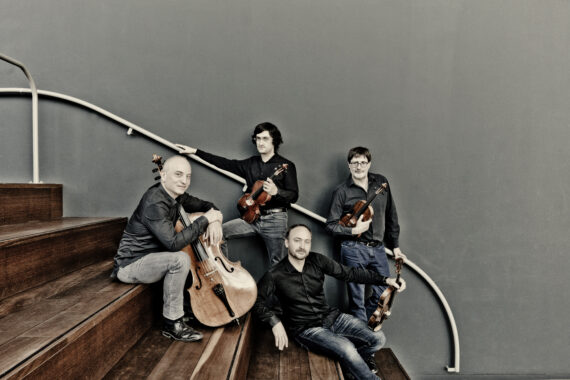Strings of Fate: Quatuor Danel Explores Beethoven and Shostakovich

The Quatuor Danel visit Stoller Hall on 28 March for a highly anticipated concert. As resident artists at the University of Manchester, the French-Belgian quartet have become a cornerstone of the city’s music scene. Renowned for their profound interpretations of Beethoven and Russian repertoire, they have earned an international reputation for tackling some of the most demanding works in the chamber music canon.
Marking 50 years since Shostakovich’s death, the Danels present his String Quartet No. 15 — a deeply introspective and haunting work composed near the end of his life. Paired with Beethoven’s String Quartet No. 15, a piece that navigates themes of struggle, transcendence and renewal, the programme promises an unforgettable exploration of human expression at its most profound.
We spoke with violist Vlad Bogdanas to gain insight into this extraordinary pairing.
What’s the story behind the Quatuor Danel?
The Quartet started in 1991 with Marc Danel and Gilles Millet on the violin, together with Marc’s siblings Juliette and Guy on the viola and cello, respectively. Today, Marc and Gilles are the only original members left. I joined them in 2005 and our cellist, Yovan Markovitch, has played with us since 2014.
Our repertoire is large and diverse with a special focus on the complete string quartets by Beethoven, Shostakovich and Weinberg. Other Russian composers, such as Borodin, Gubaidulina, Prokofiev and Tchaikovsky, are also often present in our programmes.
What makes Shostakovich’s String Quartet No. 15 so special?
Shostakovich’s fifteenth and final quartet is regarded as the composer’s own requiem. Written in 1974 a year before he died, it’s quite a dark piece with rather transparent textures that require extreme concentration as far as intonation and ensemble-playing are concerned.
Finding the right character through all six movements (six adagios!) is probably the main challenge. Shostakovich said the first movement should be played “so that flies drop dead in mid-air, and the audience starts leaving the hall from sheer boredom.”
How does it relate to Beethoven’s String Quartet No. 15?
Both pieces are strong and of epic proportions. Both composers were absolute masters of their art at that point, and amazing storytellers. It’s hard not to be hooked from the first to the last note in this programme.
The contents and the expression in the two works, however, are different. Where there’s resignation and austerity in Shostakovich’s fifteenth quartet, there’s recognition and even joyful moments in Beethoven’s.
What do you hope audiences will take away from your performance?
I can’t answer this question because the music in this programme is so special. It can touch one’s innermost feelings. It goes beyond words.
Friday 28 March 2025 at 7.30pm
SHOSTAKOVICH String Quartet No. 15 in E-flat minor, Op. 144
BEETHOVEN String Quartet No. 15 in A minor, Op. 132

